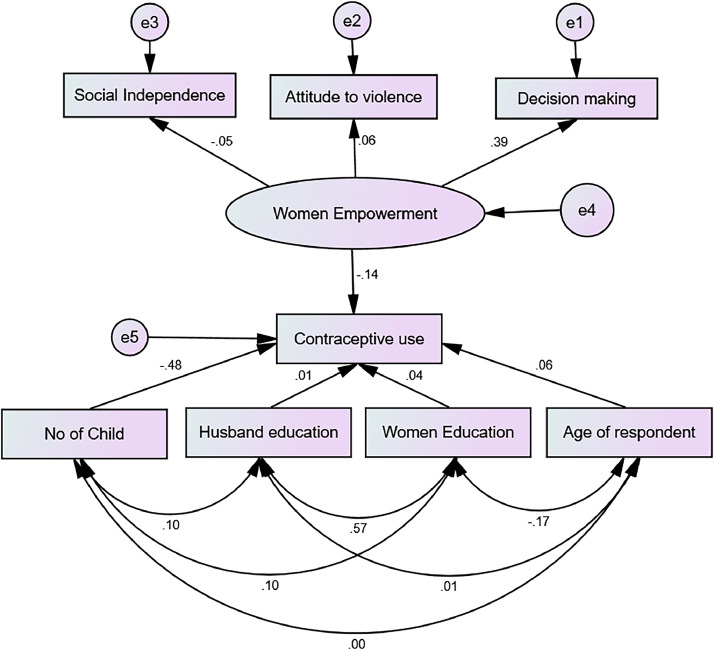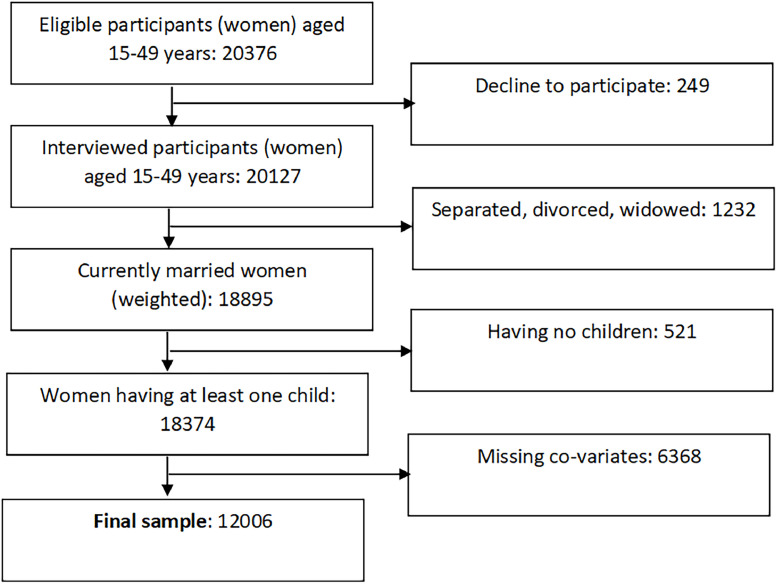在孟加拉国,妇女赋权是否会影响避孕措施的使用?使用结构方程模型分析2017-2018年人口健康调查结果。
引用次数: 0
摘要
背景:赋予妇女权力是一个关键问题,但作为已婚妇女使用避孕药具有助于实现可持续发展目标的一个因素,研究较少。目的:本研究旨在评估妇女赋权与避孕药具使用之间的关系。研究设计:本横断面研究使用了2017-2018年孟加拉国人口与健康调查数据,其中包括12,006名年龄在15至49岁之间的女性(加权)。使用层次逻辑回归和结构方程模型来显示妇女赋权与避孕药具使用之间的关系。结果:总体而言,避孕措施使用的增加与年龄的增加、城市居住、财富指数的增加和夫妻双方的教育水平有关。在控制了个体和地方因素后,回归模型的结果显示,妇女在决策、对待暴力的态度和社会独立性方面的赋权显著影响避孕药具的使用(PP>.05)。结论:本研究表明,更多的妇女赋权可能并不总是避孕措施使用的一个更强的决定因素,因此,其他影响因素,如年龄、教育、宗教、丈夫的参与、参与决策、经济地位和夫妻关系,应该考虑。本文章由计算机程序翻译,如有差异,请以英文原文为准。


Does women empowerment alone influence contraception utilization in Bangladesh perspective? Findings from the 2017–2018 Demographic Health Survey using a structural equation model analysis
BACKGROUND
Women empowerment is a crucial issue that is less studied as a factor of contraceptive use among married women that helps to achieve sustainable development goals.
OBJECTIVE
This study aimed to assess the relationship between women empowerment and contraceptive use.
STUDY DESIGN
This cross-sectional study used 2017–2018 Bangladesh Demographic and Health Survey data, which included 12,006 women (weighted) aged 15 to 49 years. Hierarchical logistic regression and structural equation models were used to show the relationship between women empowerment and contraceptive use.
RESULTS
Overall, increased use of contraception was associated with increased age, urban residence, increased wealth index, and education level of both the husband and wife. After controlling individual and locality factors, the findings from the regression model showed that women empowerment in terms of women decision-making, attitude toward violence, and social independence significantly influences contraceptive use (P<.05). However, the structural equation model analysis revealed a negative but nonsignificant relationship between overall women empowerment and contraceptive use (β=−0.138; P>.05).
CONCLUSION
This study implies that greater women empowerment may not always act as a stronger determinant of contraceptive use, and therefore, other contributing factors, such as age, education, religion, husband's participation, joined decision-making, economic status, and couple relationship, should be considered.
求助全文
通过发布文献求助,成功后即可免费获取论文全文。
去求助
来源期刊

AJOG global reports
Endocrinology, Diabetes and Metabolism, Obstetrics, Gynecology and Women's Health, Perinatology, Pediatrics and Child Health, Urology
CiteScore
1.20
自引率
0.00%
发文量
0
 求助内容:
求助内容: 应助结果提醒方式:
应助结果提醒方式:


